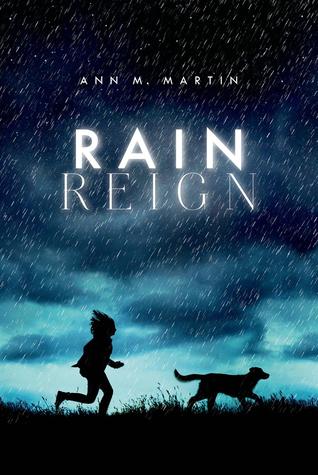 I feel like it's starting to become a tired trope, on this blog, for me to say, "I really wanted to hate this book, but I ended up liking it." Of course, that tired trope itself is based on my own weariness with certain children's literature tropes that feel tired and worn out. Which ones does this book include? Autism, a missing mother, a neglectful father, a lost dog, and some weird childhood obsessions (homophones, prime numbers, and rules, in this case).
I feel like it's starting to become a tired trope, on this blog, for me to say, "I really wanted to hate this book, but I ended up liking it." Of course, that tired trope itself is based on my own weariness with certain children's literature tropes that feel tired and worn out. Which ones does this book include? Autism, a missing mother, a neglectful father, a lost dog, and some weird childhood obsessions (homophones, prime numbers, and rules, in this case).You already know that I liked it anyway, though, so I guess Ann Martin must have breathed some new life into those elements. Her protagonist, Rose Howard, ends up feeling like a real kid, and her relationship with her overwhelmed, borderline-abusive father rings sadly true as well. Rose (and can I just mention here that I'm really glad she doesn't have some whimsical name like Prunella) (of course, that wouldn't be a homophone) has "an official diagnosis of high-functioning autism," and the book jacket states that she suffers from OCD as well, though that is never spelled out within the text. Rose struggles at home and at school, clinging to her list of homophones, her routines, and her rules in order to feel safe. When her dog Rain disappears during a storm, however, everything in her life is called into question.
One thing I appreciate about Rose, as a character, is that she is genuinely irritating. The audio version of the book makes that especially clear, as the listener must wait patiently for her to spell every homophone she runs across. This is a refreshing antidote to some of the "magical autistic kids" that we've seen in the past, who are filled with preternatural wisdom and a distinct lack of human failings. Not so Rose. It's all too obvious why the people around her get fed up with her incessant homophones, her blurting out of prime numbers, and her tendency to stand up on buses and shout about THAT DRIVER WHO DIDN'T USE THEIR DIRECTION INDICATOR.
(On second thought, I often feel like doing that last one myself, but you know what I mean.)
Yes, Rose is a real kid, but I am less convinced about whether she reflects a real understanding of autism and/or Obsessive Compulsive Disorder. As Sam pointed out, some of her mannerisms feel a bit like TV Autism (Rain Man, etc.). I do not feel qualified to comment further, but the portrayal of the disorders made me uneasy.
I am also unconvinced that her personal growth in the second act of the story comes about naturally. With the help of her uncle, she hatches a plan to find Rain, and calls around to every animal shelter in the area to ask about her dog. She also helps console another child whose family property was devastated by the storm. It's not that I think Rose couldn't get there eventually, but I don't think Martin shows us a gradual enough build-up to these successes.
This is all making it sound like I didn't like the book after all, but I promise I did. The characters are well-drawn, the prose is well-crafted, and the themes are well-realized. This is all displayed most notably in the third act of the book, where Rose has to reconcile her love for Rain with her compulsion to obey the rules. The ramifications of this choice resonate into the final pages of the book with great beauty and sadness, enough so that the final, homophone-filled line of the story seems both triumphant and inevitable.
Published in October by Feiwel & Friends.
No comments:
Post a Comment